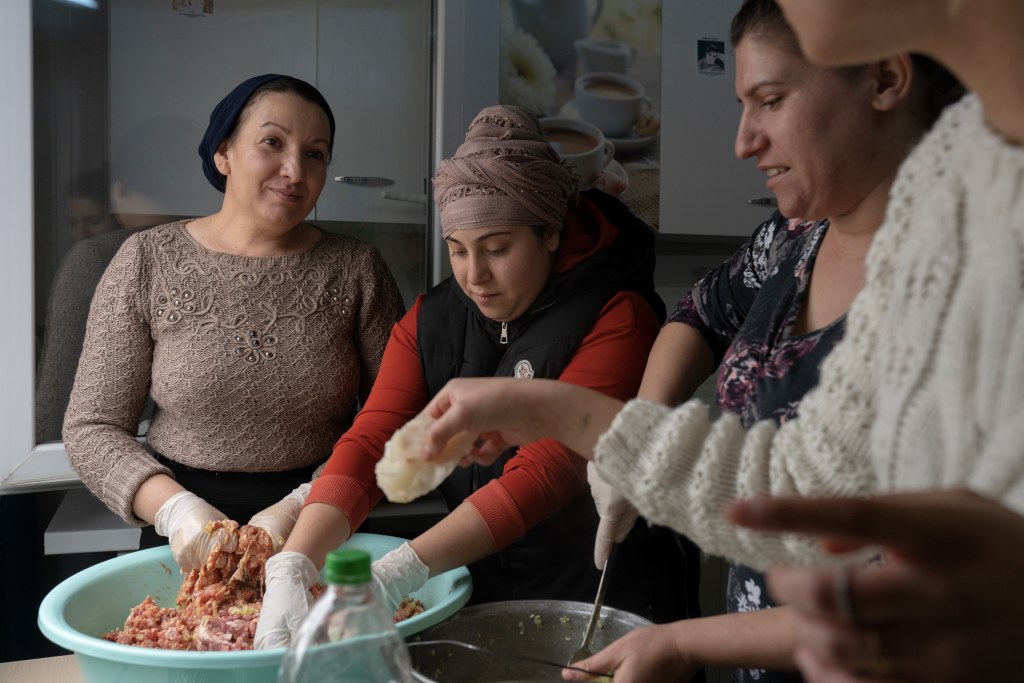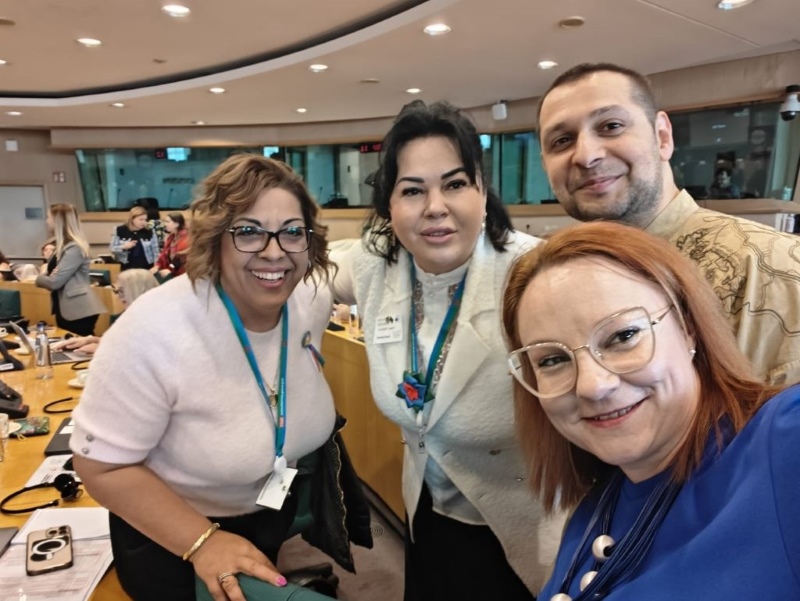20 years of working with Roma: from emergency aid to EU advocacy
17.4.2025
The Deaconess Foundation has been working with Roma people for 20 years. During this time, work with Roma in Finland has expanded to include migrant Roma and extensive cooperation with Roma organisations in Finland and Eastern Europe. National and EU-level advocacy work has long been part of this effort.

Roma women from Mizil village, Romania, cook together at the community centre. Photo: E-Romnja
Roma people are Europe’s largest and most discriminated against ethnic minority. Discrimination has impacted their lives for centuries. As a result, the lives of many Roma, especially in Eastern Europe, are still affected by severe poverty, poor housing conditions, lack of services and lower life expectancy than the rest of the population.
Work to promote Roma rights was therefore a natural continuation of the Deaconess Foundation’s long-term efforts to support people in vulnerable positions. Breaking the cycle of exclusion and intergenerational deprivation is essential to ensure everyone can live a life of dignity.
The Deaconess Foundation’s work with the Roma minority began when the Kaalo Service Centre began operating in 2005. The aim was to provide low-threshold services for marginalised Roma with substance abuse and mental health problems, and to create pathways to work and education.
Eastern European Roma on the streets of Helsinki
In 2007, Helsinki woke up to a new social phenomenon when people from Romania and Bulgaria arrived on the streets to busk and beg for money.
“People from the discriminated and impoverished Roma minority set up small tents in the forest, and the police came to pull them down. It was a sad time,” says Anca Enache, Human Rights Specialist at the Deaconess Foundation.
Enache was involved in the first project mapping the situation of Eastern European Roma in Finland, Rom po Drom. Commissioned by the City of Helsinki and launched in the summer of 2008, the project aimed to establish contact with Roma who had arrived in Finland, assess the situation and respond to immediate needs. Even then, plans were being made to improve the situation of Roma in Eastern Europe.
From emergency aid to creating livelihood opportunities
The Deaconess Foundation organised temporary emergency accommodation for Roma on several occasions from 2009 onwards, including during severe cold spells and for families arriving with children. Established emergency accommodation for Roma was finally opened in 2016, although in the first few years it was only open from October to April. Year-round emergency accommodation began to be offered at the start of the Covid-19 pandemic in 2020.
In 2011, the Deaconess Foundation established the Hirundo Day Centre for Roma from Eastern Europe with support from the City of Helsinki and Helsinki Parish Union. There, they can receive individual support, get a snack, do laundry and take showers. Hirundo has been key in building strong trust with Eastern European Roma in Finland. In 2024, the day centre moved to the same premises as Al Amal day centre for undocumented people, which further strengthened the ability to offer diverse services to Roma residing in Finland.
In autumn 2022, Hirundo Mobile was launched – a vehicle adapted as an office that brings psychosocial support and advisory services to where people hang out.
“Over the years, the focus of the work has shifted from emergency aid in Finland to more sustainable solutions, such as creating conditions for livelihoods. Through the Keikkapooli project, the Work and Hope cooperative was established in the greater Helsinki area, through which Roma who had arrived in the country found employment in cleaning and other home services,” says Maria Dorofte, Programme Coordinator at the Deaconess Foundation and former Service Manager of Keikkapooli.
Today, the Deaconess Foundation also promotes the employment of Roma with immigrant backgrounds in Pietarsaari.
International work began in Romania
Since working with Roma from Eastern Europe was new in Finland, exchanging experiences and networking with European partners was essential from the very beginning.
“Discrimination against Roma was and still is one of Europe’s biggest human rights problems. It was clear from the start that the Deaconess Foundation wanted to promote Roma inclusion and the realisation of their human rights in Eastern European countries through both practical support and advocating for structural change,” says Enache.
The Eastern European Roma work began ten years ago in Romania, in the village of Valea Seacă, from which many Roma who came to Finland originated. The work was community-based and relied heavily on the organisation and activities of the village women themselves. The Deaconess Foundation wanted to support Roma women in particular, as they are in a weaker position not only due to discrimination from the majority population but also within their own communities.
The work has primarily supported Roma women in the villages to stand up for themselves, influence decision-making and demand their rights. As a result, authorities have finally made improvements to the village infrastructure.
“Coming together became our community’s superpower,” says Laura Voinea, a community worker from Mizil village, to which the activities started in Valea Seacă expanded.
“The women in our community are no longer afraid. They know where to find support if they encounter violence or discriminatory treatment by the authorities,” adds Lăcrămioara Călin, community worker from Valea Seacă village.
Activities expands in the EU and beyond
Since 2015, the Deaconess Foundation has implemented other projects in cooperation with organisations operating in the EU area, including those related to reducing discrimination against Roma, realising Roma women’s rights, multiple discrimination and strengthening digital inclusion for Roma.
At the same time, there were plans to expand development cooperation, which until then had mainly focused on the southern Africa region, to promote Roma rights. The first Roma work projects funded by the Ministry for Foreign Affairs were launched in 2019. In Kosovo, work focused on supporting the access of young Roma to education and employment, while a regional project operating in Moldova, Ukraine and Belarus promotes Roma women’s rights. In 2021, a project promoting Roma inclusion was also launched in Ukraine.
“These projects are coming to an end by the end of 2025, but if the Ministry for Foreign Affairs continues to support our activities, we will further strengthen Roma work in Eastern Europe and the Balkans,” says Enache.
In Eastern Europe, work is always done in cooperation with Roma organisations operating in each country, which are experts in their own field and implement projects in practice. At the same time, the operational capabilities of partner organisations are strengthened through training, exchange of experiences and networking, so that they can better promote the realisation of Roma rights in the future.
Influencing Roma policy prompts structural changes
Strengthening the role of Roma organisations in national and EU-level advocacy work has been one of the most important goals of the Deaconess Foundation’s international Roma work. In addition, the Deaconess Foundation itself actively influences Roma policy, especially at the European level.
EU-level advocacy work on Roma issues is important because EU mechanisms can ensure that EU member states and countries wishing to become members promote the realisation of Roma rights. European Roma policy and monitoring its implementation have developed significantly over the years.
The Deaconess Foundation and its partner organisations also monitor the implementation of national Roma policy in their countries of operation and participate in reporting on it to the EU.

Human Rights Specialist Anca Enache from the Deaconess Foundation and representatives of Roma organisations that are partners of the Foundation from Italy, Moldova and Ukraine in the chamber of the European Parliament, April 2025.
Tireless work breeds change
“Persistent work has brought about many changes at the level of individuals and communities in Eastern Europe. Many Roma women and youth have received education and jobs or started their own businesses. Roma living without an official identity have been helped to register in state systems and thus access basic services. Roma women who have experienced domestic violence have received support,” says Maria Dorofte.
“Cooperation with authorities who often have prejudices against Roma has improved. Roma also participate more actively in decision-making and demand the realisation of their rights at different levels,” she continues.
The Deaconess Foundation has also supported the development of Eastern European Roma organisations into increasingly influential actors. As a result of advocacy work, Roma organisations are increasingly represented at the national and EU level in decision-making concerning Roma, resulting in better consideration of their rights when drafting new laws and regulations.
EU-level structures have also improved. The EU’s current Roma strategy is stronger and more concrete than the previous one. Many countries have developed local programmes as part of the national Roma programme. Local implementation is important to achieve concrete changes at the level of people and communities.
EU enlargement negotiations have brought about positive developments in countries wishing to become members. For example, in Ukraine, despite the war, major legislative reforms concerning minorities have been achieved, such as a new policy plan on Roma.
In Finland, the Deaconess Foundation has increased Finnish awareness of the human rights situation of Eastern European Roma.
Attitudes and structures change slowly
Although the Deaconess Foundation has succeeded in bringing about change for the better, there is still much work to be done.
“The current political climate and challenges to the rules-based international system make it difficult to work for the promotion of minority rights. Restrictions on civil society space often first affect minority organisations,” says Anca Enache. “The increase in hate speech affects not only individuals’ well-being but also how organisations can perform their work.”
Deeply rooted discriminatory attitudes continue to affect Roma lives across Europe in many ways, both directly and through structures. Structural discrimination is part of the social system and therefore at least partly invisible. It includes discrimination in the labour or housing market, where it is easier for some to find employment and housing than others, for example because of their name.
But influencing discriminatory attitudes and structures is a slow process.
“Much more needs to be done in Finland and elsewhere in Europe to understand and address discrimination faced by Roma. Many Roma still encounter openly racist treatment in workplaces, housing markets and healthcare. In Finland, too, the impact of racism is still under-discussed, even though it has affected the Roma minority for centuries,” says Carmen Bajram, Experience Worker for the Deaconess Foundation’s RomniME project.
“We need to recognise and acknowledge that there is structural racism in Finland and elsewhere in Europe that prevents Roma from having equal opportunities.”